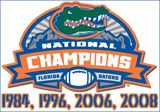How did we get to this sorry situation?
Third in a series on the "National Championship"
In our last part of this series, we established that there is not – nor ever has been, a NCAA, or “National” Champion, in Division I-A college football.
What we have, in reality, is a claim of being a “National Champion”. Various polls and/or systems decide who they think is number one, and then the schools involved “proclaim” themselves “National Champion”. My first part in this series – that Florida was the 1984 National Champion, was my contribution to making such a claim. In reality, every single school who claims to be a “National Champion” is, at some point in the process, making a claim not much different than mine.
When you really think about it, it is so ridiculous that you almost want to cry.
The question then arises – “How did we get to this sorry situation”?
Prior to 1936, when the AP paved the way by releasing a year end poll, there really was no one even making the “National Championship” claim. College football can trace its history to around the 1870’s. By the early 1900’s, many major colleges had football programs, formally or informally, like "club" teams. Florida's first fielded a football team in 1906.
One can imagine that, much like the high school football system now, in a sport with so many different participants, in so many diverse locations, and well before modern travel methods, no one thought very much about who the “National Champion” was.
By the 1930’s however, college football was popular enough that the AP decided to take a “poll” to decide who the best team was. While there were other relatively new systems in place to decide the number one team at the time, the AP was the first poll. The AP poll was initially taken in 1934, and then again in 1936, and every year since thereafter.
In 1934, the AP decided that the 8-0 Minnesota Golden Gophers were the number 1 team. In fact, if you go to the Minnesota football website, there is a picture – and a claim – of Minnesota as the 1934 “National Champions”
However, if you go to the website for the University of Alabama, imagine what you will find?
That’s right – a claim of being the 1934 “National Champions”. In that year, Alabama went 10-0.
Nothing like starting the controversy right from the beginning!
While the AP selected Minnesota in 1934, you can see from the Alabama site that their “claim” is based on selection by Dunkel, Williamson and the Football Thesaurus.
Much of what Alabama is doing here is exactly what I did in my post about the 1984 Gator “National Champions” – they are finding sources to support their claim. In fact, the very Dunkel Power Index they rely on for their 1934 claim decided that – you guessed it – Florida was the 1984 “National Champion”.
From 1936 until the mid 1960’s, the AP went about anointing college football teams as “number one” Then, in 1965, an important change took place - the AP decided not to take their poll until after the bowl games.
That’s right – every AP Champion prior to 1965 was decided before the bowl games were even played.
If you look at the initial idea of the bowl game, perhaps this made sense. Originally bowls, like the current NFL Pro-Bowl, were “rewards” for quality teams at season’s end. They were for the team and the fans to have a nice place to travel and vacation, and participate in what amounted to a college football exhibition game. By the 1960’s, however, the AP, at least, started to recognize the importance of the bowl games towards who should be decided number one. By 1968, all AP polls were taken post bowl games (for some reason, the 1966 and 1967 polls were not).
One of the most common hindrances cited by proponents of a Division I-A football playoff is the Bowl system. Bowls equal money, and money, as they say, makes the world go ‘round. Take this year’s BCS title game. At $175 face value per ticket, with 73,000 seats, that is nearly $13 million BEFORE luxury seating and endorsements are considered. Bowl games are big money – to the bowls and the schools. But more on this later.
I believe that any “National Championship” claim is dubious if it relies on a poll taken before the bowls. And not to pick on Alabama again (ah, what the hell), but they claim to be the 1964 “National Champions”. In 1964, Alabama went 10-0 prior to their bowl game, and were voted the AP champions. They then played Texas in the Orange Bowl and lost, 21-17. When the bowls were over, there was only one undefeated team – Arkansas, at 11-0. However, since the seemingly more prestigious AP and UPI polls occurred before the bowls, many do not “recognize” Arkansas as the 1964 champion, even though the majority of selectors picked the 1964 Razorbacks. Despite this, the University of Arkansas appears reluctant to make that claim. In this regard, they should take a cue from Alabama, who has never been reluctant to make a claim for their purported “12 National Titles”.
Because of the void created by the NCAA, many so called “selectors” have stepped in to make their own claims as to who is the “National Champion”. Presently, the number of known, published entities making “National Championship” appointments is nearly forty.
I have been around long enough to notice a trend in college football that some of you in their 20’s might not know – and that has been the increasing importance placed on deciding exactly who the “National Champion” is. When I first started following college football in the late 1970’s, the most important achievements were getting to a bowl game, beating your rival, and winning your conference. The idea of the “National Championship” was nice, but little discussed. It certainly didn’t seem to have the breathless importance it does now.
The reason for this, I think, is the explosion of a national sports media. Prior to ESPN, the only sources for sports news were local – your hometown newspaper, and the somewhat goofy ex sports star that did your local sports news. You might hear a brief mention of who won the AP title at year’s end, but the focus was always on the situation with your local, or state, teams. There certainly was nowhere near the level of discussion that mediums like the internet have created.
Then along came ESPN. Suddenly, sports news was national, and even international. To appeal to a national audience, ESPN could not discuss at length local teams, or even regional conferences. They had to reduce their news to the greatest commonality in order to reach the largest audience. A national audience is not going to watch in depth coverage of what the Colgate football team is doing. A large percentage of that audience, however, would be interested in what the top college teams would be doing.
Result – in college football, the one thing you can talk and speculate about endlessly is that which most every team has some chance (reasonable or not) of achieving when the season begins– “The National Championship”.
So, by a mixture of the old system of bowl games and polls, and the hyper focus by the national media on the importance of the “National Championship”, we find ourselves in the muddled mess we have. A system that, at times, permits more than one team to be a “National Champion.” A system based on the ability of, or even the audacity of, a team to claim that it IS the “National Champion”.
I submit that the Florida Gator’s claim to the 1984 National Championship is every bit as valid as Alabama’s 1934 claim, and even more valid than Alabama’s 1964 claim. But that is exactly the problem. Any system based on claims, and not wins, is bound to have flaws.
Big flaws.
Next: Dubious claims of a “National Championship” – You Listening Alabama?






 Mentioned in Austin Murphy's book
Mentioned in Austin Murphy's book 


4 comments:
2 things mattered to OSU fans...
1. Beat Michigan
2. Win the Rose Bowl (mostly...Beat USC)
So the fact that the Rose Bowl was an afterthought actually pissed me off this year...
but of course...it's all NCAA hoops mentality...that you have to have an undisputable national champion.
Which to me...is ridiculous...
pojo, I wouldn't say it's ridiculous. I mean I can understand why the mentality exists. As Mergz pointed out the sports scene is much more national now. We have charter flights and the games are televised nationally. Is it offensive to traditionalists? Yes. But I think that train left the station a long time ago. The NCAA is headed for a playoff. The only question is: when and how many teams?
And the truth is that the BCS has been the agent of change. Paradoxically it's the the incremental improvements that have been made to the BCS system that are leading toward the playoff.
What I think is ridiculous is the idea that 32 bowl games (26 of which are worthless) make more money than a playoff system.
I'm getting really, really, really tired of enjoying a Gator blog. Seriously, stop writing interesting stuff that I want to read. It makes me feel dirty. ;-)
Should we look at the BCS as the necessary pain before the gain? Money would flow into a Division I-A playoff, just like the Bowls. They're already dragging the bowls out over endless weeks now... a playoff wouldn't be that different.
Thanks for the compliment. We aim to please. This blog isn't generally about name calling (unless it's Kirk Herbstreit or some other talking head). So anyone can enjoy it.
Post a Comment